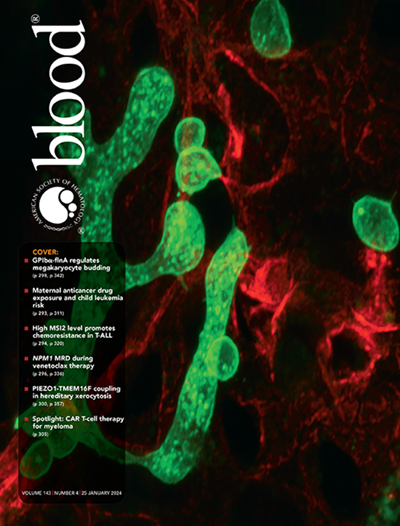Isatuximab for Relapsed and/or Refractory AL Amyloidosis: Results of a Prospective Phase 2 Trial (SWOG S1702).
IF 23.1
1区 医学
Q1 HEMATOLOGY
引用次数: 0
Abstract
Isatuximab is an IgG1k monoclonal antibody that binds with high affinity to CD38 expressed on plasma cells. Anti-CD38 antibodies have shown efficacy as monotherapy and in combination in a variety of settings for patients with multiple myeloma and light chain (AL) amyloidosis. This multi-center, cooperative group phase 2 trial was designed to evaluate hematologic response, organ response, and safety of isatuximab monotherapy for the treatment of relapsed AL amyloidosis. Isatuximab at 20 mg/kg was administered intravenously weekly during the first 28-day cycle and then every other week during cycles 2-24. Forty-three patients were registered, with 35 patients being evaluable for response. The overall hematologic response rate was 77.1%, with 57% of patients achieving a VGPR or better. The median time to partial response or better was 1.1 months. Renal response occurred in 50% (7/14) of patients with renal involvement and cardiac response occurred in 57% (8/14) of patients who were evaluable utilizing NT-pro-BNP with cardiac involvement. The most common treatment related grade ≥3 adverse events included lymphopenia (n=3, 8.5%) and infection (n=2, 6%). Isatuximab demonstrated substantial efficacy in previously treated patients with AL amyloidosis and was associated with a good safety profile. This trial was registered at www.clinicaltrials.gov as NCT#03499808.Isatuximab治疗复发和/或难治性AL淀粉样变性:一项前瞻性2期试验(SWOG S1702)的结果
Isatuximab是一种IgG1k单克隆抗体,与浆细胞上表达的CD38具有高亲和力。抗cd38抗体在多种情况下对多发性骨髓瘤和轻链(AL)淀粉样变性患者的单药治疗和联合治疗均显示出疗效。这项多中心合作组2期试验旨在评估isatuximab单药治疗复发性AL淀粉样变性的血液学反应、器官反应和安全性。Isatuximab在第一个28天周期内每周静脉注射20mg /kg,然后在第2-24周期内每隔一周静脉注射一次。43名患者登记,其中35名患者可评估反应。总体血液学缓解率为77.1%,57%的患者达到VGPR或更好。达到部分缓解或更好的中位时间为1.1个月。50%(7/14)的肾脏受累患者出现肾脏反应,57%(8/14)的心脏受累患者出现心脏反应。最常见的治疗相关≥3级不良事件包括淋巴细胞减少(n= 3,8.5%)和感染(n= 2,6%)。Isatuximab在先前治疗的AL淀粉样变性患者中显示出实质性的疗效,并具有良好的安全性。该试验在www.clinicaltrials.gov上注册为NCT#03499808。
本文章由计算机程序翻译,如有差异,请以英文原文为准。
求助全文
约1分钟内获得全文
求助全文
来源期刊

Blood
医学-血液学
CiteScore
23.60
自引率
3.90%
发文量
955
审稿时长
1 months
期刊介绍:
Blood, the official journal of the American Society of Hematology, published online and in print, provides an international forum for the publication of original articles describing basic laboratory, translational, and clinical investigations in hematology. Primary research articles will be published under the following scientific categories: Clinical Trials and Observations; Gene Therapy; Hematopoiesis and Stem Cells; Immunobiology and Immunotherapy scope; Myeloid Neoplasia; Lymphoid Neoplasia; Phagocytes, Granulocytes and Myelopoiesis; Platelets and Thrombopoiesis; Red Cells, Iron and Erythropoiesis; Thrombosis and Hemostasis; Transfusion Medicine; Transplantation; and Vascular Biology. Papers can be listed under more than one category as appropriate.
 求助内容:
求助内容: 应助结果提醒方式:
应助结果提醒方式:


